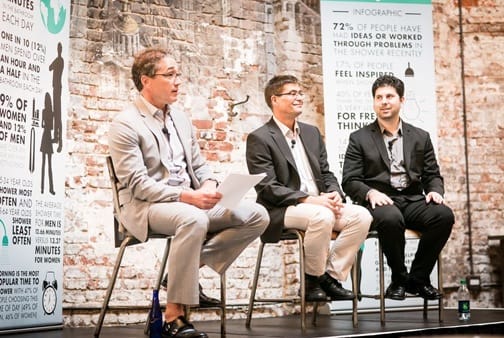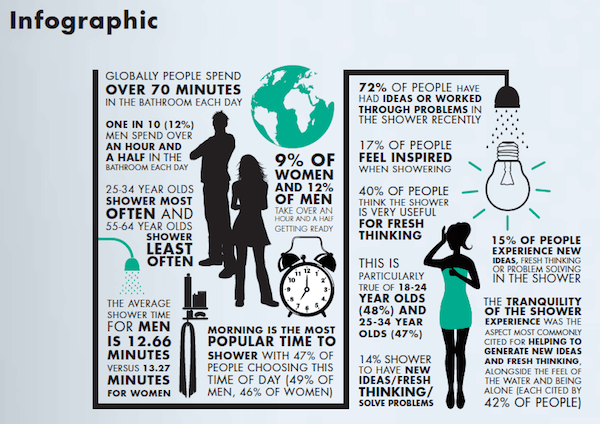Hansgrohe, one of the leaders in shower technology, design and sustainability, asks Scott Barry Kaufman Ph.D. to explore the connection between creativity and the shower.

(from l to r) Hansgrohe SE Deputy CEO Richard Grohe and Hansgrohe USA President Erik Christensen recently discussed the fascinating survey with Dr. Kaufman at Houston Hall Biergarten in NYC.
A nice relaxing shower can feel really good, especially after a long day at work. But can showering have deeper benefits for the mind? For instance, can showering make it more likely that a brilliant insight will pop into consciousness, or that a solution to a longstanding personal problem will finally be found? The latest science of creativity suggests the answer to these questions may be yes.
The entire creative process — from that first burst of inspiration to the final drops of paint on the canvas — consists of many different stages. Certainly, focused mental effort and preparation are important stages of the creative process. But the science of creativity suggests that our most insightful creative ideas don’t emerge when we are focused intensely on solving a problem. Instead, creative insights tend to arise in those moments when our prepared mind has wandered away from the task at hand.
 In one recent study led by Benjamin Baird at UC Santa Barbara (*[1]), researchers measured “divergent thinking” by asking participants to generate as many unusual uses as possible for a common object (such as a brick) in a limited amount of time. Then they had participants go through an “incubation” period for 12 minutes, in which they engaged in various functions. They found that those who were given an easy task to perform during the incubation period showed greater improvements on the divergent thinking task than participants who engaged in a demanding task, sat quietly, or who had no break. In fact, those who engaged in the undemanding task displayed an improvement of 40 percent on the measure of creativity!
In one recent study led by Benjamin Baird at UC Santa Barbara (*[1]), researchers measured “divergent thinking” by asking participants to generate as many unusual uses as possible for a common object (such as a brick) in a limited amount of time. Then they had participants go through an “incubation” period for 12 minutes, in which they engaged in various functions. They found that those who were given an easy task to perform during the incubation period showed greater improvements on the divergent thinking task than participants who engaged in a demanding task, sat quietly, or who had no break. In fact, those who engaged in the undemanding task displayed an improvement of 40 percent on the measure of creativity!
Mind wandering may facilitate creative insights by increasing the colliding of long-range ideas and memories that aren’t obvious to the conscious mind. The latest neuroscience of creativity suggests that imagination — a crucial element of creative thinking — draws on the very same mental machinery as mind wandering and daydreaming. What’s more, research on jazz musicians and rappers suggests that the brain regions associated with mind wandering are highly active during creative improvisation, while the brain areas associated with attentional control and self-criticism are relatively quieter.
Showering may increase the creative flow of ideas by relaxing our minds, and allowing our thoughts to wander, free from the constraints of our inner critic. Showering also insulates us from the external world, allowing us to resist environmental distractions and really focus all of our attention on our deepest desires, daydreams, and memories. In this way, showering may increase the chances that a broader creative connection will be forged.
Finally, the change of scenery that showering affords can cause a constructive shift in perspective. Research suggests that any unusual and unexpected event — from living abroad to buttering toast a different way — can lead to an increase in the ability to mentally shift between different ideas (*2, *3).
Rather than living abroad, merely leaving your living room and jumping in the shower may be all that is required to see things a bit differently. When trying to solve a problem by consciously thinking it through, we can too easily get stuck in a particular mode of thought. Taking a shower can jolt us out of our ordinary awareness, and create the necessary distance to force us to entertain a different perspective.
Want to increase your creativity? Prepare as much as possible, but then take a good, long shower. You may just shower your way to a brilliant new idea!
Scott Barry Kaufman is a cognitive psychologist interested in the development of intelligence, creativity and personality. He applies a variety of perspectives to come to a richer understanding and appreciation of all kinds of minds and ways of achieving greatness. In his latest book, ‘Ungifted: Intelligence Redefined’, he presents a new theory of human intelligence that he presents a holistic approach to achievement that takes ino account each person’s personal goals, individual psychology, and developmental trajectory.
Dr. Kaufman is an adjunct assistant professor of psychology at New York University, where he teaches courses on cognitive psychology and human intelligence. He is also co-founder of “The Creativity Post” and he writes the blog “Beautiful Minds for Scientific American Mind.”
Dr. Kaufman supports open-access scientific publishing and is on the editorial board of two open-access journals: ‘BioMed Central’ (BMC) ‘Psychology’ (section editor) and ‘Journal of Intelligence’. He completed his doctorate in cognitive psychology from Yale University in 2009.
(*1) Baird, B., et al. (2012). Inspired by distraction: Mind wandering facilitates creative incubation. Psychological Science, 23, 1117-1122.
(*2) Ritter, S.M., et al. (2012). Diversifying experiences enhance cognitive flexibility. Journal of Experimental Social Psychology, 48, 961-964.
(*3) Simonton, D.K. (1994). Greatness: Who makes history and why. New York, NY: The Guilford Press.




Join the conversation: